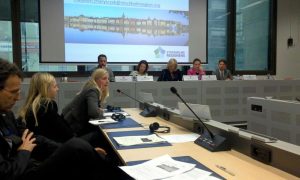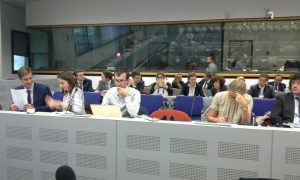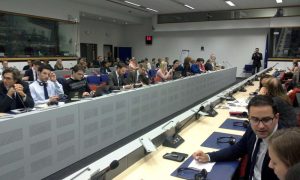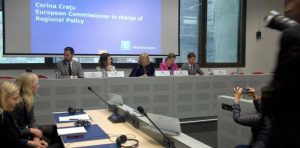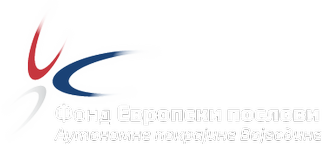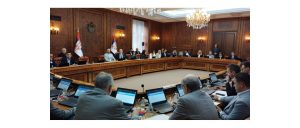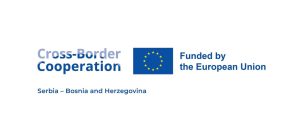Meeting with Commissioner Creţu and Regional Offices
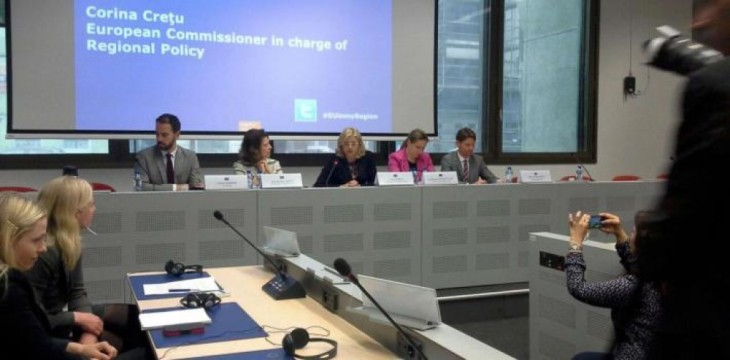
The European Commissioner for Regional Policy, Corina Creţu, met with the representatives from the Regional Offices in Brussels on 17 May 2016. Among the topics discussed in the third meeting were migration, the Urban Agenda, simplification for beneficiaries of EU funds and the Future of Cohesion Policy post 2020. The Commissioner was particularly interested to hear about regions’ practical experiences, the challenges they face and solutions they have found in relation to these topics.
The Commissioner underlined that the implementation of long-term measures to help the integration of migrants in urban regions was a priority. In 2015, 10 thematic objectives were defined and the explicit priority of the integration of migrants could be a line in the ERDF and Social Fund in the future. She stressed that the Regional Policy was flexible to the challenges the EU was facing. She announced a novelty in the Cohesion Policy involving cities’ direct receipt of financial resources and creation of programmes. She also announced that at the end of May, the new Urban Agenda and Amsterdam Pack would be signed in the Netherlands, which would create a framework for cities to implement the EU policies and legislation, allow better use of EU funds and exchange of experience. She confirmed that additional resources would be invested in urban areas and the funding available to support cities were valued at EUR 100 billion from the ERDF in 2014-2020. As a pivotal priority of her mandate, the Commissioner indicted the simplification of the Regional Policy, which was complex and complicated at the moment, with more than one hundred guidelines at the EU level, including complicated procedures at the national level. She founded a twelve-member high level group to deliver concrete results on the topic, especially the application of good practice from the Junker investment plan, which was described as concrete and simple. The EC needed to work with EP REGI Committee, CoR and Eurocities on the matter.
Examples of good practice were presented by Stockholm and Berlin Regions, with projects implemented in the sphere of integration of migrants and refugees into the society and labor markets. The conclusion was that rapid integration into the labor market was crucial for the success of the integration policies and the implementation of communication methods with the newly arrived known to them. A lot was expected from the simplification of the future Cohesion Policy, to be the priority in 2016 and next year. The Commissioner stressed that migration was a European problem, that the EC was ready to help and that the political priorities in the EU changed. The EU funds could help in the emergency situations, like it was done in the case of Italy and Greece, as well as the creation of the Migration and Integration Fund. The goal was to implement long-term measures to help the integration of migrants, especially in urban regions. Policies needed to tackle poverty in urban areas, since a lot of migrants would stay in Europe, taking into account the situation in their countries of origin. The EC would change the operational programs, especially in Italy and Greece, so that they could co-finance the measures dealing with migrants and asylum seekers. All Member States needed to define what they wanted to change. The Commissioner stated that rural urban synergy was needed.
Madlen Charyszak, Policy Officer at Stockholm Region EU Office, presented the project dealing with the integration of migrants in Stockholm. Around 35 000 unaccompanied refugee minors entered Sweden last year, and a lot of them came to Stockholm Region, which created a shortage of social housing. Rapid integration to the labor market was crucial for the success of the integration policies. It was achieved by implementation the YFI project, offering language courses and profession training in the profession which were needed in the labor market.
The Commissioner underlined the success of the Swedish system, which could stop radicalization and creation of second grade citizens and avoid the creation of ghettoes and segregation, however, the representatives of the rural Swedish regions commented that migrants often left rural areas and migrated to urban areas and that eight years were needed to integrate them into the labor market.
Volker Löwe, Head of Office of the Land Berlin to the EU, presented the activities of the Region of Berlin regarding the integration of migrants. The project “Neighbors Mothers” provided training for women of immigrant background who could help new migrant families to integrate into the German society. The project was marked as a successful one, since its implementation started in 2004 and was still running. In total 406 mothers were trained and 74 were active at the moment, with a total result of around 9400 home visits until May 2016. Approximately 80,000 refugees came to Berlin in 2015, of which 43,000 still lived in public shelters. It was a pressure to the city of 3.5 million inhabitants, which stretched its capabilities to the maximum. The ERDF was to invest EUR 635 million in 2014-2020, and around EUR 100 million to improve the social integration in the deprived areas. Löwe spoke about an additional financial flexibility in the ongoing and new financial framework and a close link with the Urban Agenda and Regional Policy. He underlined that transparency, participation and a binding force were key elements for the success of the Urban Agenda and implementation of the principle of multilevel governance. The Commissioner shared her personal experience from Berlin and fully supported the measures taken, adding that other cities could greatly benefit from the experiences of Berlin and Stockholm.
The experience of France were presented by Nicolas Lété, Head of Delegation of Auvergne-Rhône-Alpes to Brussels. He underlined the ongoing change in the structure of the French regions, which number reduced, and the creation of a system in which beneficiaries needed to focus on concrete projects, not merely on procedures, by applying the principle of proportionality. A clear difference needed to be drawn between mistakes and frauds, trusting more the national level and delegating the management from the EC to MSs. The Commissioner added that the error rate in 2014 was 6.1%, whereas the fraud rate 0.55%. She expressed her wish for a better legislation and management after 2020. In conclusion, she expressed her satisfaction with the success of the Regional Policy in Poland, with around EUR 100 billion already invested, making the country a completely different one.
Further information: http://ec.europa.eu/regional_policy/en/newsroom/news/2016/05/17-05-2016-meeting-with-commissioner-cretu-and-regional-offices
